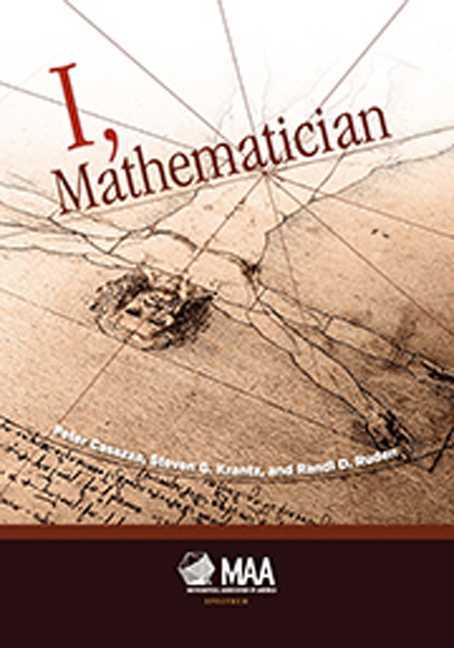Book contents
- Frontmatter
- Contents
- Preface
- Part 1 Who Are Mathematicians?
- Foreword to Who Are Mathematicians?
- 1 Mathematicians and Mathematics
- 2 What Are Mathematicians Really Like? Observations of a Spouse
- 3 Mathematics: Art and Science
- 4 A Mathematician's Survival Guide
- 5 We Are Different
- 6 The Naked Lecturer
- 7 Through a Glass Darkly
- 8 What's a Nice Guy Like Me Doing in a Place Like This?
- 9 A Mathematician's Eye View
- 10 I am a Mathematician
- Part II On Becoming a Mathematician
- Part III Why I Became a Mathematician
9 - A Mathematician's Eye View
from Part 1 - Who Are Mathematicians?
- Frontmatter
- Contents
- Preface
- Part 1 Who Are Mathematicians?
- Foreword to Who Are Mathematicians?
- 1 Mathematicians and Mathematics
- 2 What Are Mathematicians Really Like? Observations of a Spouse
- 3 Mathematics: Art and Science
- 4 A Mathematician's Survival Guide
- 5 We Are Different
- 6 The Naked Lecturer
- 7 Through a Glass Darkly
- 8 What's a Nice Guy Like Me Doing in a Place Like This?
- 9 A Mathematician's Eye View
- 10 I am a Mathematician
- Part II On Becoming a Mathematician
- Part III Why I Became a Mathematician
Summary
I have been working in university mathematics for forty years, mainly in the United Kingdom, but with two years in the United States, a year in Germany, and six months in New Zealand.
My current position is slightly unusual: twelve years ago I stopped giving lectures to undergraduates, so that I could focus on “public understanding of science.” I did this with the encouragement of my home institution, the University of Warwick, which has always had a remarkably enlightened view of such activities. The research component of my job remained unchanged—except that I wrote more research papers per year after I had stopped lecturing.
My perspective on mathematics at the university level is therefore different, in some ways, from that of a typical mathematician. The work on the public understanding of science involves such things as radio broadcasts, television, writing for newspapers and magazines—and more recently making podcasts and contributing to websites.
What follows is a series of thoughts about particular issues concerning mathematics: both within the subject, and in relation to the outside world.
What Are Your Thoughts on Mathematical Genius?
Some people seem to have a natural ability to think mathematically, at a much higher level of difficulty than others. I do not think that the label “genius” is a good one, however, because it carries a great deal of historical baggage, much of it wrong or simple-minded. It is the experience of most professional mathematicians that some students can understand new ideas very rapidly and develop them in their own minds without much apparent effort, while others struggle with simple concepts and seem unable to grasp what the subject is really about.
These statements contradict the conventional wisdom in psychological circles, which seems to be that there is no such thing as natural talent. Instead, every child is a blank slate, upon which anything can be written, and the only difference between a genius and an ignoramus is a lot of hard work.
As proof of this in the context of mathematics, a study made by Binet around 1900 is often cited. He found that French cashiers in shops were better at arithmetic than most calculating prodigies, but the cashiers came from all walks of life. The usual deduction is that anyone can be trained to calculate fast and accurately, so that “mathematical talent” is solely a matter of hard work and practice.
- Type
- Chapter
- Information
- I, Mathematician , pp. 103 - 111Publisher: Mathematical Association of AmericaPrint publication year: 2015

